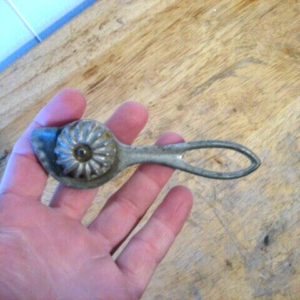Iconic Trench Lighters: A Testament to Wartime Ingenuity
Diverse Descriptions
Here are some responses about the mysterious object:
- Trench Lighter: “I’ve got one from my father. The original was often made from spent rounds. Using the cartridge and a few modifications, you have a lighter. I had a twenty calibre case with an old threepenny coin soldered in the base.”
- Army Lighter: “It lights in the wind while covering the flame so you wouldn’t get your face shot off.”
- Replica: “It’s likely a replica.”
- Miniature Nuclear Bomb Hand Grenade: “DON’T pull the pin!”
- Austrian 1920s IMCO Windproof Lighter: “It looks like a copy.”
- Treadle Sewing Machine Bobbin: “It resembles a bobbin for an old machine.”
- Brass Lighter: “I’ve got one made of brass.”
- Windless Lighter: “Hard to find parts, but worth the effort to make it work.”
- Awesome Find:
- Miniature German Hand Grenade: “Used by trained suicide ferrets in WWI. They ran up your pants leg and detonated at a critical juncture.”
- Military Torchlight: “Used when you cannot light campfires in the military.”
- Haven’t Seen One in a Long Time:
- WWII Trench Lighter:
- Windproof Lighter:
- I Have One, It’s a Lighter:
- It’s a Coconut, Duh:
- Prototype Proto Pipe:
- Steampunk Suppository:
- Fire Starter, Flint:
- Vintage Lightsaber:
- Vibrator from 1890:
Historical Insight: The WW1 Trench Lighter
The WW1 Trench Lighter is an iconic piece of history, a testament to the ingenuity born out of necessity during wartime. Soldiers in the trenches needed a reliable way to light their cigarettes or pipes amidst harsh conditions. Traditional lighters were often unreliable in the wet and muddy trenches.
Design and Utility
Enter the Trench Lighter. This simple yet effective device was typically made of metal, featuring a hinged mechanism that protected the flame from wind or rain. Soldiers could easily ignite it with one hand, leaving the other free for other tasks.
These lighters were often crafted from spent bullet casings or other scrap materials found on the battlefield. This showcased the resourcefulness of soldiers facing adversity. While their primary function was to provide light and fire, they also became cherished keepsakes, serving as tangible reminders of wartime experiences.
Collector’s Item
Despite being relics of a bygone era, WW1 Trench Lighters continue to be sought after by collectors and history enthusiasts. They offer a tangible connection to the soldiers who once carried them in the trenches.
More About Trench Lighters
The WW1 Trench Lighter, also known as a “pipe lighter” or “pocket lighter,” holds a unique place in military history. Born out of the exigencies of trench warfare, these lighters were not just functional tools but also symbolic artifacts of soldierly resilience and innovation.
Ingenious Design
The Trench Lighter’s design was simple yet effective. Typically crafted from brass, steel, or other durable metals, it had a tubular casing with a hinged lid to protect the flame. A flint and striking wheel mechanism inside produced a spark, igniting the fuel reservoir.
Adaptability and Resourcefulness
These lighters were designed to withstand the damp, muddy, and windy environment of the trenches. The hinged lid shielded the flame and prevented fuel loss, ensuring reliable ignition even in adverse weather.
Personalization
Many soldiers crafted their own lighters using materials like spent bullet casings or other battlefield scrap. This resourcefulness provided a practical means of lighting cigarettes or pipes and personalized each lighter with unique marks of its creator.
Sentimental Value
Trench Lighters held significant sentimental value. They became cherished mementos, imbued with memories of camaraderie, hardship, and survival. Engraved initials, regimental insignia, or personal markings often adorned these lighters, transforming them into tangible links to the past.
Enduring Legacy
While the heyday of Trench Lighters ended with WWI, their legacy endures. Today, these vintage lighters are prized by collectors and history enthusiasts for their historical significance and the personal stories they represent.



